Continued from page 50 of the May 2013 issue.
Photos by Sandie Parrott




PLEASE NOTE: In the autumn of 1995, we hatched the idea for a free, local gardening publication. The following spring, we published the first issue of Michigan Gardener magazine. Advertisers, readers, and distribution sites embraced our vision. Thus began an exciting journey of helping our local gardening community grow and prosper.
After 27 years, nearly 200 issues published, and millions of copies printed, we have decided it is time to end the publication of our Print Magazine and E-Newsletter.
Continued from page 50 of the May 2013 issue.
Photos by Sandie Parrott




This site uses Akismet to reduce spam. Learn how your comment data is processed.
Copyright 1996-2025 Michigan Gardener. All rights reserved.
Paulina says
Thanks for finally talking about >Profile Website Extra: More photos of Bob Grese’s garden – Michigan Gardener <Liked it!